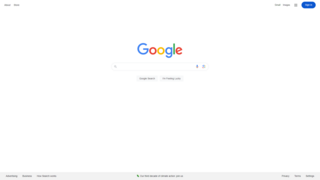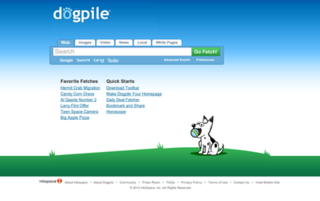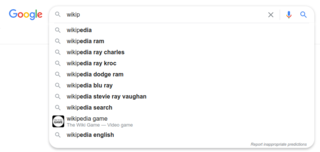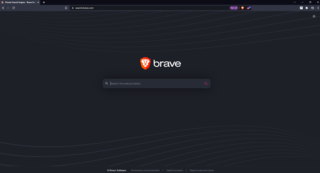
Google Search is a search engine operated by Google. It allows users to search for information on the Internet by entering keywords or phrases. Google Search uses algorithms to analyze and rank websites based on their relevance to the search query. It is the most popular search engine worldwide.
In computing, a search engine is an information retrieval software system designed to help find information stored on one or more computer systems. Search engines discover, crawl, transform, and store information for retrieval and presentation in response to user queries. The search results are usually presented in a list and are commonly called hits. The most widely used type of search engine is a web search engine, which searches for information on the World Wide Web.

In computer network communications, the HTTP 404, 404 not found, 404, 404 error, page not found, or file not found error message is a hypertext transfer protocol (HTTP) standard response code, to indicate that the browser was able to communicate with a given server, but the server could not find what was requested. The error may also be used when a server does not wish to disclose whether it has the requested information.
Search engine optimization (SEO) is the process of improving the quality and quantity of website traffic to a website or a web page from search engines. SEO targets unpaid traffic rather than direct traffic or paid traffic. Unpaid traffic may originate from different kinds of searches, including image search, video search, academic search, news search, and industry-specific vertical search engines.
Web syndication is making content available from one website to other sites. Most commonly, websites are made available to provide either summaries or full renditions of a website's recently added content. The term may also describe other kinds of content licensing for reuse.
Internet research is the practice of using Internet information, especially free information on the World Wide Web, or Internet-based resources in research.
The deep web, invisible web, or hidden web are parts of the World Wide Web whose contents are not indexed by standard web search-engine programs. This is in contrast to the "surface web", which is accessible to anyone using the Internet. Computer scientist Michael K. Bergman is credited with inventing the term in 2001 as a search-indexing term.

Dogpile is a metasearch engine for information on the World Wide Web that fetches results from Google, Yahoo!, Yandex, Bing, and other popular search engines, including those from audio and video content providers such as Yahoo!.

A metasearch engine is an online information retrieval tool that uses the data of a web search engine to produce its own results. Metasearch engines take input from a user and immediately query search engines for results. Sufficient data is gathered, ranked, and presented to the users.
Google AdSense is a program run by Google through which website publishers in the Google Network of content sites serve text, images, video, or interactive media advertisements that are targeted to the site content and audience. These advertisements are administered, sorted, and maintained by Google. They can generate revenue on either a per-click or per-impression basis. Google beta-tested a cost-per-action service, but discontinued it in October 2008 in favor of a DoubleClick offering. In Q1 2014, Google earned US$3.4 billion, or 22% of total revenue, through Google AdSense. AdSense is a participant in the AdChoices program, so AdSense ads typically include the triangle-shaped AdChoices icon. This program also operates on HTTP cookies. In 2021, over 38.3 million websites use AdSense.
Federated search retrieves information from a variety of sources via a search application built on top of one or more search engines. A user makes a single query request which is distributed to the search engines, databases or other query engines participating in the federation. The federated search then aggregates the results that are received from the search engines for presentation to the user. Federated search can be used to integrate disparate information resources within a single large organization ("enterprise") or for the entire web.

A search engine is a software system that provides hyperlinks to web pages and other relevant information on the Web in response to a user's query. The query is typically done within a web browser or a mobile app, and the search results are presented as a list of hyperlinks, accompanied by textual summaries and images.
A search engine results page (SERP) is a webpage that is displayed by a search engine in response to a query by a user. The main component of a SERP is the listing of results that are returned by the search engine in response to a keyword query.
Google Personalized Search is a personalized search feature of Google Search, introduced in 2004. All searches on Google Search are associated with a browser cookie record. When a user performs a search, the search results are not only based on the relevance of each web page to the search term, but also on which websites the user visited through previous search results. This provides a more personalized experience that can increase the relevance of the search results for the particular user. Such filtering may also have side effects, such as the creation of a filter bubble.
Personalized search is a web search tailored specifically to an individual's interests by incorporating information about the individual beyond the specific query provided. There are two general approaches to personalizing search results, involving modifying the user's query and re-ranking search results.
Yandex Search is a search engine owned by the company Yandex, based in Russia. In January 2015, Yandex Search generated 51.2% of all of the search traffic in Russia according to LiveInternet.
Contextual search is a form of optimizing web-based search results based on context provided by the user and the computer being used to enter the query. Contextual search services differ from current search engines based on traditional information retrieval that return lists of documents based on their relevance to the query. Rather, contextual search attempts to increase the precision of results based on how valuable they are to individual users.
Local search engine optimization is similar to (national) SEO in that it is also a process affecting the visibility of a website or a web page in a web search engine's unpaid results often referred to as "natural", "organic", or "earned" results. In general, the higher ranked on the search results page and more frequently a site appears in the search results list, the more visitors it will receive from the search engine's users; these visitors can then be converted into customers. Local SEO, however, differs in that it is focused on optimizing a business's online presence so that its web pages will be displayed by search engines when users enter local searches for its products or services. Ranking for local search involves a similar process to general SEO but includes some specific elements to rank a business for local search.
Search engine privacy is a subset of internet privacy that deals with user data being collected by search engines. Both types of privacy fall under the umbrella of information privacy. Privacy concerns regarding search engines can take many forms, such as the ability for search engines to log individual search queries, browsing history, IP addresses, and cookies of users, and conducting user profiling in general. The collection of personally identifiable information (PII) of users by search engines is referred to as tracking.

Brave Search is a search engine developed by Brave Software, Inc., which is set as the default search engine for Brave web browser users in certain countries.






